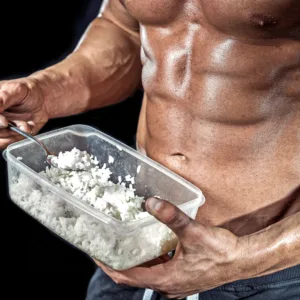Reducing the number of calories you eat per day can be an effective weight-loss method. However, figuring out exactly how many calories you should eat can be tricky, as it depends on a variety of factors, including your age, sex, size, and activity level.
What are Calories?
Calories, as mentioned, is the amount of energy we consume per day – usually in the form of foods or drinks. Consuming large amounts of calories will allow you to have more energy to fuel your lifestyle as well as your workouts. Of course, that doesn’t mean that more is necessarily better.
If you see yourself as having an active lifestyle – perhaps you have a job that requires you to be constantly moving – then it would only be logical for you to need larger amounts of calories than what a sedentary person may need. If you haven’t guessed already, caloric intake is highly dependent on the individual.
Our bodies will burn calories at a fairly constant rate, even if we’re not actively doing anything. For example, did you know that you’re actually using up calories while eating? Whether it be the number of times you move your jaw to chew your food voluntarily or the automatic digestion of foods that happens inside of our bodies. These processes can lead to the burning of calories.
For example, “…if you consume 100 fat calories… 3 [of those[ calories will be spent digesting [said] fat.” This is not limited to just fats. Varying amounts of energy is used to digest food. In comparison, eating “…300 protein calories… will burn off 90 calories [in] digesting the protein.” Everything you do can lead to a certain degree of fat burn. Although the effects are minimal compared to, for example, if you incorporate high-intensity workouts or cardio exercises into your routines.
What are Calories Used for?
The foods that we consume can be used for a number of things. It’s often separated into three different categories: proteins, carbohydrates, and fats. Each have their own purpose, and any healthy diet requires a certain amount of all three. Decreasing or increasing how much of each you consume can have a dramatic effect on your own body constitution.
For example, low-carb diets are now a pretty popular short-term solution to quick weight loss. Most diets require a larger amount of carbohydrates than fats or proteins, which makes a sudden decrease in the amount of it that you eat lead to some dramatic weight loss. Not having enough access to carbohydrates should force your body to fuel your activities with the fat that had been stored instead.
As for protein, if you’re not new to the life of fitness, you’re probably familiar with its effects on a person’s ability to create lean muscle mass. This is the mass that might be hidden under the fatty skin in your body – depending on how much you weigh. You can build up lean muscle mass to promote a more sculpted physique – which can be toned through strength training. Protein is vital to the construction of muscles, as well as the maintenance and recovery of said muscles.
Caloric Intake
The importance of calories when dieting relies on how much of it you eat, and how much of it you deprive yourself of in order to make or lose gains. The calories you consume with either be turned into cells used for energy or be stored as body fat. This prompts the necessity to get just enough, in order to prohibit weight gain.
Specifics will rely on the individual’s body constitution. One might need to cut back on a certain macronutrient in order to lose weight, and another might have to increase their caloric intake in hopes of making gains. As for genetic differences, someone who is short should consume fewer calories than someone who is tall. The same goes for an individual’s gender, age, body fat percentage, etc.
Check Out Our List Of The Best Supplements For Building Muscle, Shredding Muscle, Recovery, And Great Health, and Wellness Products! Purchase ifbnewsfeed.org‘s apparels Here: ifbnewsfeed.org
- Get $200 With Your 1st Order Because Your Health Matters
- Best Supplements For Muscle Building, Strength & Champion Performance
- Best Supplements For Intense Energy, Performance & Endurance
How many calories should you be eating per day?
As mentioned, this is highly dependent on the individual. You can try to base it on an existing number, but there are different official recommendations for caloric intake around the world, so trying to make a guess based on that might not be as straightforward as you think. If you’re really struggling you can try out one of the many fitness apps or websites out there that offer a calorie counting service – they should be able to provide a number quite simply.
The National Health Service (NHS) in the UK mentions that “…the average male adult needs approximately 2,500 calories per day to keep his weight constant, while the average adult female needs 2,000.” On the other hand, in the US the recommendation is more along the lines of “…2,700 calories per day for men and 2,200 for women.”
Try one of these numbers out for yourself, preferably a little lower than the average, and make changes based on the results that you get. If you’re looking to make muscle, and nothing seems to be changing – increase your caloric intake a little at a time. If you’re looking to lose weight, do the opposite.
Importance of calories when dieting
This is just the basics on the importance of calories when dieting, there are other things that can play a part in it too. Like not getting enough of the nutrients that your body needs or getting too much of it – which can halt or damage the progress you wish to make with your body.
If you really want to take getting to know the importance of calories when dieting seriously, then you’re going to have to be prepared to spend some time on the subject. Also, some changes might take a little longer than others, but the sooner you can begin to understand the effects of your caloric intake on your body the better.
More About The Importance of Dietary Variety Contents
- Learn “Everything You Need To Know” Before Starting The Clean Eating Diet Plan
- The “7 Top Muscle Building Nutrition Food Sources” To Gain Muscle Mass, Strength, And Staying Proactive

- A1Supplements.com – America’s Favorite Supplement Store.
- Shop Optimum Nutrition Energy: Anytime & Pre-Workout
- A1Supplements.com – Lose Fat, Gain Muscle!
Resource:
- Jon Williams How Many Calories Does Digestion Use Up?https://www.livestrong.com/article/320370-how-many-calories-does-digestion-use-up/
- Christian Nordqvist How Many Calories Should I Eat a Day?https://www.medicalnewstoday.com/articles/245588.php








